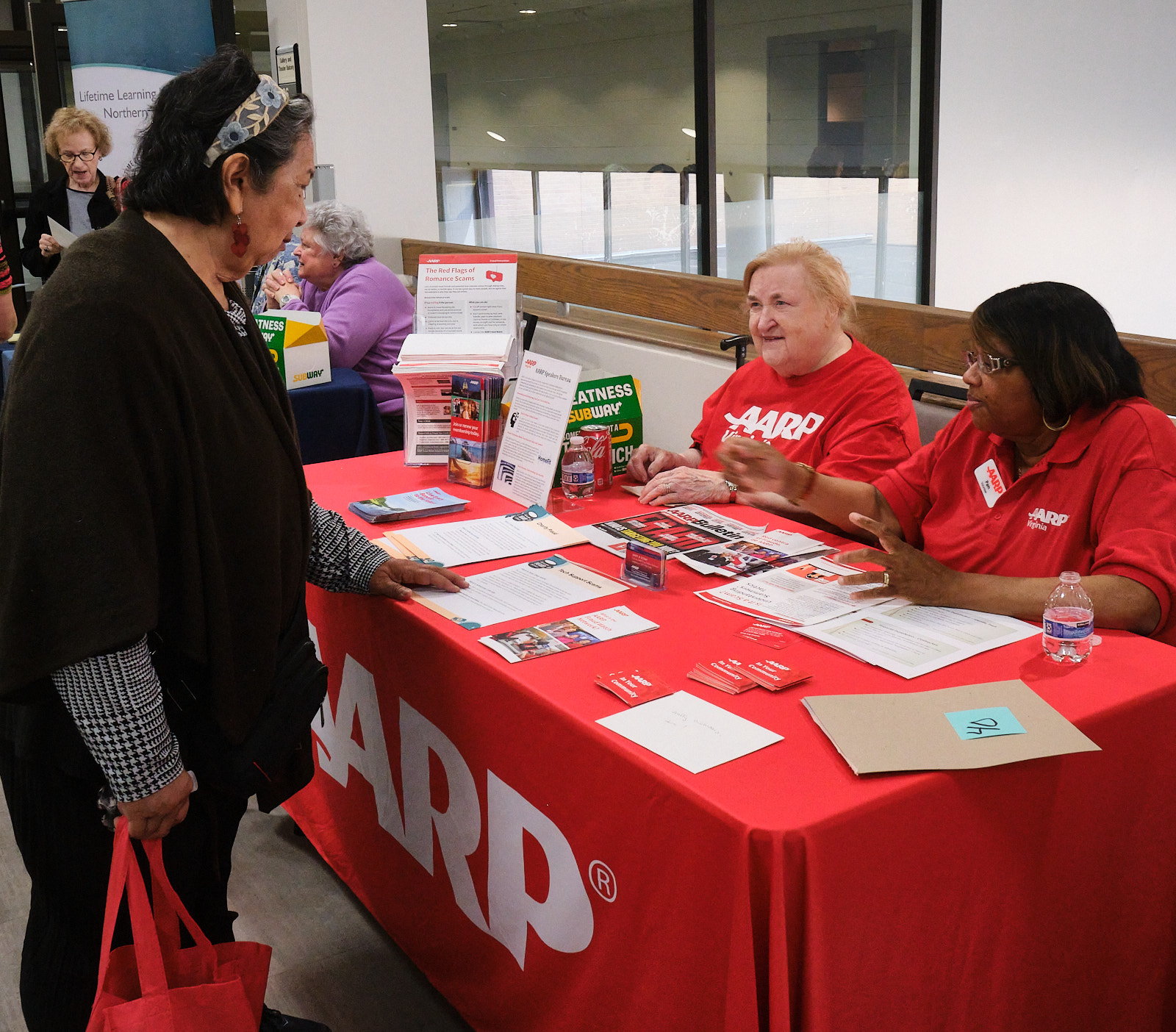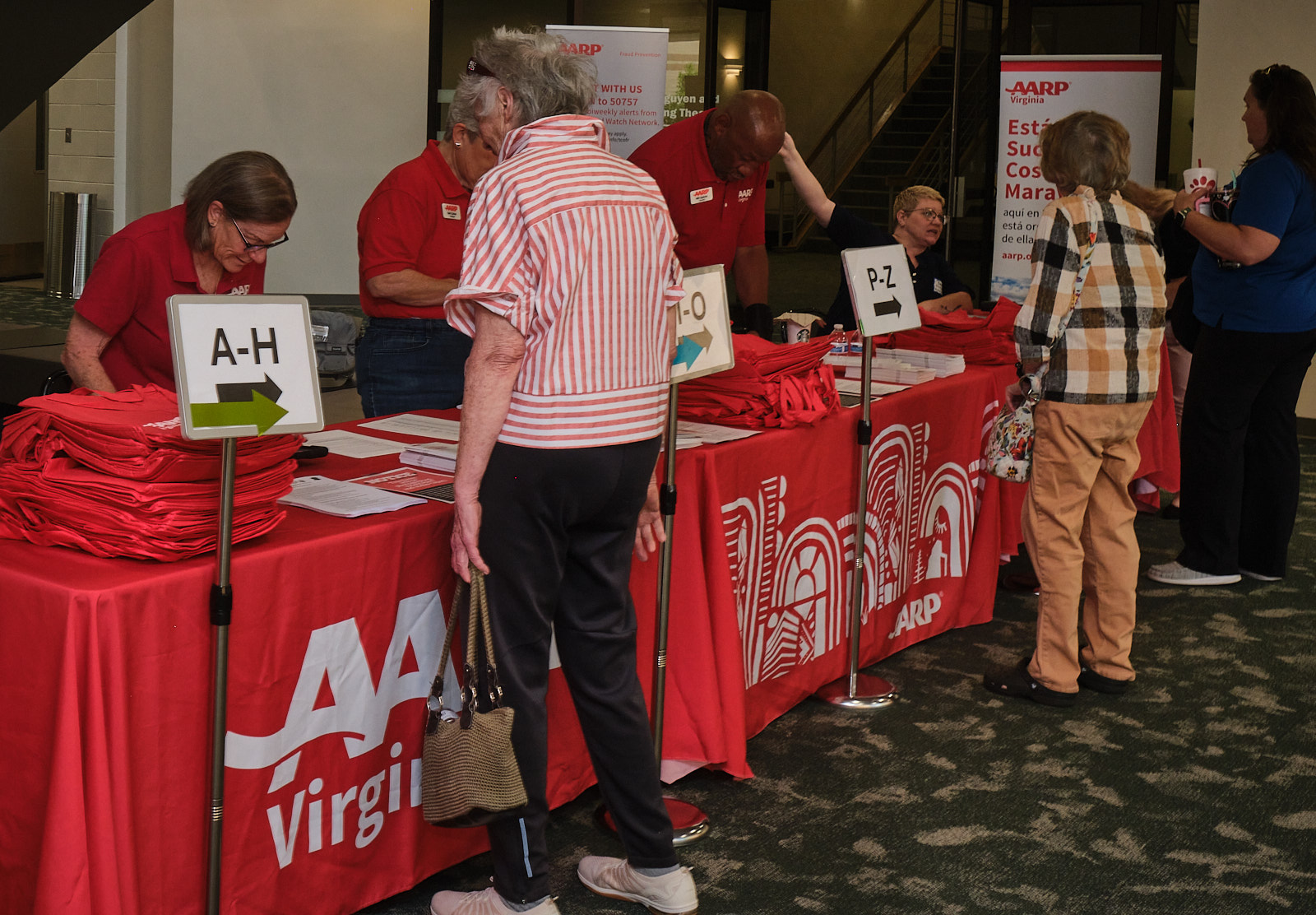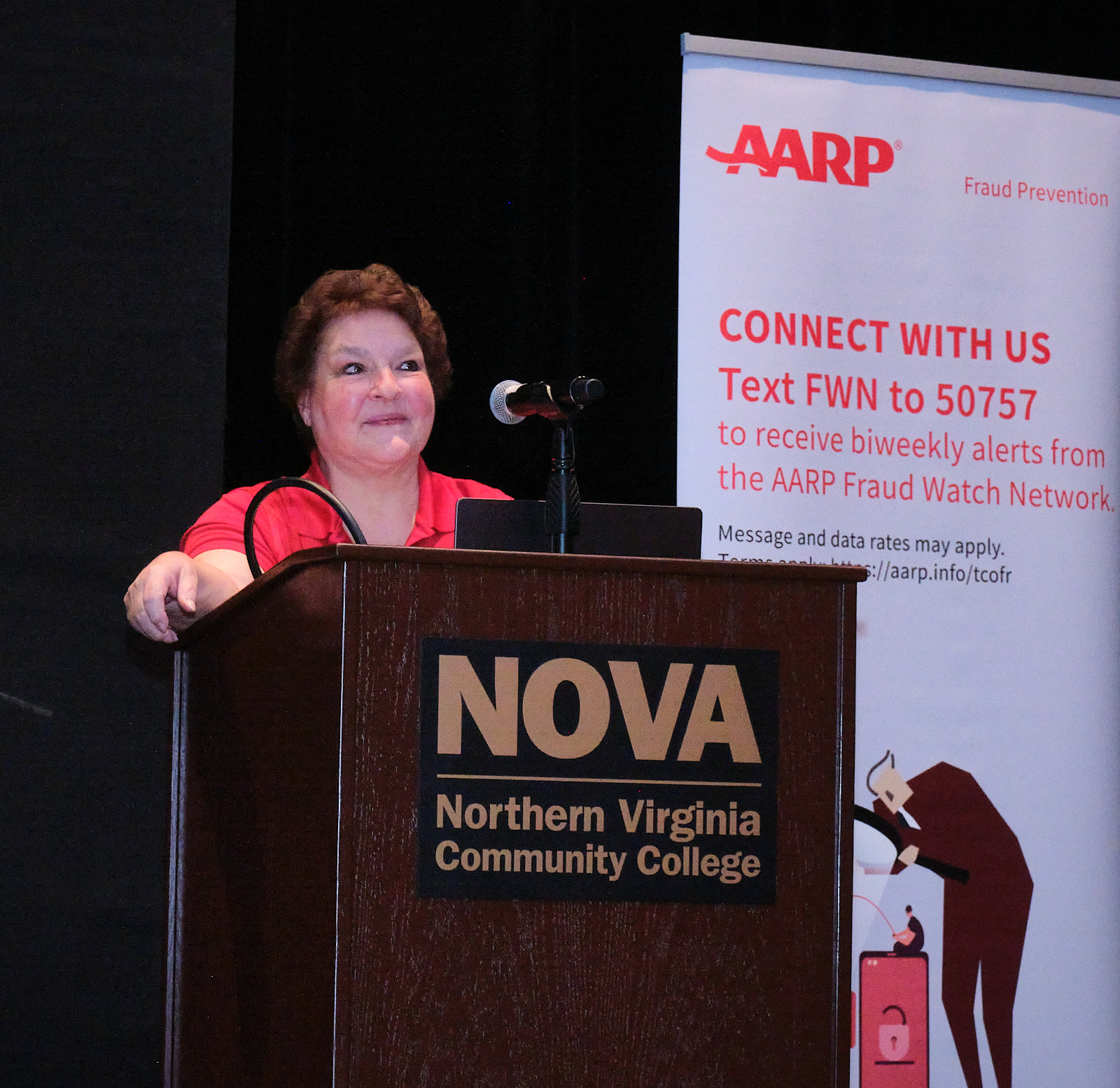AARP Hearing Center
Elder Fraud
“It takes the community to fight fraud” said former San Diego Deputy District Attorney Paul Greenwood at the 8th Annual Fairfax Scam Jam, sponsored by AARP Virginia and Fairfax County’s Silver Shield Anti-Scam Campaign.
Greenwood, an AARP Fraud Watch Network advisor, explained his elder justice journey began in 1996, when his boss, the San Diego district attorney, received an angry phone call from the local adult protective services (APS), complaining about the office’s failure to prosecute elder fraud cases. When his boss put him in charge of a newly established elder justice unit, neither of them knew much about elder fraud or APS. What he learned, said Greenwood, “lit a fire in me that is still blazing today.”

His purpose, said Greenwood, was to put victims, who are often silent, in the spotlight. He cited seven reasons why victims remain silent.
· The first is impairment. Often a victim is asked to sign a document, but they don’t understand what they are signing which could result in handing their assets over to someone who will take advantage of them. Greenwood believes notaries public should be trained to recognize signs of potential fraud.
· The second reason is isolation. Greenwood believes that fraud begins when a victim is in an isolated environment. An example is when a caretaker takes advantage of the victim because he has no one to turn to.
· Shame or embarrassment is another reason victims, especially older adults, don’t report fraud. They see succumbing to fraud as a sign of weakness.
· Often the victim has a sense of loyalty to their abuser. Greenwood shared the story of a woman who was beat up by her son. This son had been released from prison for murdering her other son, she didn’t want to prosecute him because she had already lost one son and didn’t want to lose the other.
· Another reason for failing to report is the fear of losing independence. The abuser may threaten the victim, telling them not to report or they’ll “end up in a nursing home.”
· Sometimes the victim relies on the abuser, especially if the abuser is a caretaker. The victim is fearful of reporting because of the dependence on the abuser.
· Fear of retaliation is another reason for victim silence, especially in an assisted living situation, when the victim may fear the abuser or their allies will treat them badly.
Greenwood realized that to reach the people who needed help, he should change his style from reactive to proactive by getting out into the community to listen to older adults. He visited community centers and mobile home parks to build relationships with potential victims and their families.
He found that many didn’t know about APS, or how to report abuse and fraud. He began a campaign of erecting billboards about different types of fraud, with the phone number for people to call. In the process Greenwood identified many misconceptions and myths related to fraud and abuse.
· Ageism - older adults are unreliable witnesses or that they are forgetful. This often results in hindered investigations.
· Nothing can be done if the victim refuses to provide information.
Police reports show victims refusing to press charges when asked. The fact is “Victims should never get to press charges,” said Greenwood. “Only prosecutors should press charges.” He believes if a crime occurs, the abuser should be charged and punished, or they will continue to commit the crime.
· Giving someone money is not considered a crime. Greenwood believes it can indeed be a crime and not just a civil matter. “What appears on the surface as consensual is not always what it appears to be,” said Greenwood.
· The power of attorney documents prevents the abuser from stealing and plundering. Unfortunately, the victim often did not understand what they signed.
· No prosecution if the victim is deceased Such cases should be treated in the same manner as murder cases, said Greenwood. Because the victim is deceased does not mean a crime didn’t occur.
· A transaction with a contract, such as a home improvement scam, is a civil and not criminal matter. If fraud occurs, it can be prosecuted as a criminal case.
· If the crime didn’t occur in the prosecutor’s jurisdiction, they may not want to press charges. But Greenwood believes it is a crime if the victim resides in the jurisdiction even if the abuser lives elsewhere. He cited a recent case where the Loudoun County Sheriff’s office prosecuted a cryptocurrency fraud that preyed upon county residents living in different jurisdictions.
“It takes all of us to keep us safe,” said Greenwood. A multidisciplinary team consisting of social agencies like APS, law enforcement, and prosecutors work most effectively. “Pursuing justice for as many victims as possible – that’s our goal,” said Greenwood.

Mountain Daisy
The episode titled “Mountain Daisy” was screened at the Scam Jam, and it tells the story of an elderly woman whose relatives tried to force her off her property and exploit her. It is part pf HOAP (Heroes of Adult Protection), one of the six-part docuseries, HOAP (Heroes of Adult Protection), developed by the Clowder Group with support from the National Adult Protection Services Association.is a six-part docuseries Each episode tells the story of real cases and how the community responds when vulnerable adults face abuse and what it takes to keep them safe.
Daisy was a woman in her 80s who lived on a remote mountain in Oregon. According to her friend and neighbor Cindy, she did not have life outside of the mountain. But as she and her husband aged, it became a struggle to help them.
Distant relatives arrived and said they would provide assistance in return for having their names on the property deed. But they trashed everything and the property became a big junkyard.
After Daisy’s husband died, they threatened her by saying they could light a match next to her cabin and the property would go up in smoke. When Cindy and her husband tried to intervene, the relatives reported and blocked them from the property, saying Daisy couldn’t take care of herself.
APS investigator Patty Nelson was assigned to the case. “I don’t think people realize so many seniors have nobody and don’t know what APS is,” said Nelson. As with all cases, she showed up unannounced at Daisy’s property, where she realized there was a “whole other story.”
APS shifted the investigation from Cindy and her husband to the relatives, who had begun cutting down trees on the property to sell for lumber after Daisy died. They were charged with being on the property and taking property against Daisy’s wishes.
When a hearing was held to ban the relatives from the property, Daisy, who seldom left the property, had to appear in court and was accompanied by her friend Cindy. The judge was kind and patient with her, even coming down from the bench to sit next to her.
Unfortunately, her nephew Chris stayed on the property despite the restraining order and hiding from the authorities. He intimidated Daisy by pounding on her door at night, shooting random gunshots, and inciting his dogs to bark.
Law enforcement became more deeply involved, eventually arresting Chris and charging him with intimidation and civil elder abuse. This required Daisy to make another court appearance.
But the second judge was not so kind. He repeatedly asked Daisy to explain in detail why she was afraid of Chris, resulting in traumatizing and intimidating Daisy. Fortunately, at the end he agreed to sign the restraining order.
Daisy got to live the rest of her life on her land, with her neighbors looking out for her. “Thank goodness others got on the bandwagon and helped out,” said Cindy. “If no one got involved, no one would have known.”
Cindy and her husband were deeded the property after Daisy died, and it is now protected from the abusive relatives.
The Clowder Group expects to have resources available to help educate the public about the role of APS by June of this year.

Panel Discussion
The final event of the day was a panel of local APS staff and law enforcement personnel, moderated by Paul Greenwood. APS staff from Fairfax, Spotsylvania, Loudoun, Arlington, and Prince William Counties and the City of Alexandria discussed some of the initiatives and challenges in their respective localities.
Fairfax County has a Financial Exploitation Task force and good community outreach, thanks to the Silver Shield program, but still finds getting people to accept they have been scammed an obstacle. In Spotsylvania, the main goal of APS is to keep people in their homes as long as possible. In Alexandria, financial fraud cases have surpassed cases of self-neglect. People who often think they are business savvy are the ones who have a hard time believing they’ve been scammed. Loudoun has a unique situation as they are both urban and rural, with rural residents being more isolated. “Loudoun had a lot of senior housing, but not much of it is affordable,” said Samantha Dotson. Arlington has also seen a huge increase in financial exploitation crimes but is hampered by a small financial exploitation investigative team. Prince William doesn’t have a financial exploitation task force but tries to work closely with law enforcement and other agencies.
Greenwood asked the group how their respective APS staffing compares to child protective services (CPS) staffing. The consensus, supported by national statistics provided by Greenwood, is generally five to one between CPS staffing and APS.
Greenwood indicated 10,000 people turn 65 daily in America, and by 2035 there will be more residents over 65 than under 18. He called the CPS to APS ratio “outrageous,” and lauded the APS workers by saying, “you are all heroes.”
Two Fairfax County police detectives, Michael Morris and Jamaah Cheatham, both stressed that their main objective is to provide education in the form of community outreach to older adults and their families to prevent them from becoming victims of scams. They also lamented that law enforcement is short staffed, but they continue to do as much as they can.
Fairfax County Assistant County Attorney, May Shallal, said her office works closely with APS on civil abuse cases. She explained that in Virginia, the county or city attorney handles civil cases, while Commonwealth’s Attorneys prosecute criminal cases.
Click here to view a recap of the 2025 Scam Jam.
For more information about scams and how to protect yourself, contact the AARP Fraud Watch Network online or call the Fraud Watch Helpline at 877-908-3360. If you are a victim of a scam, the Fraud Watch Network offers a victim support program.































































